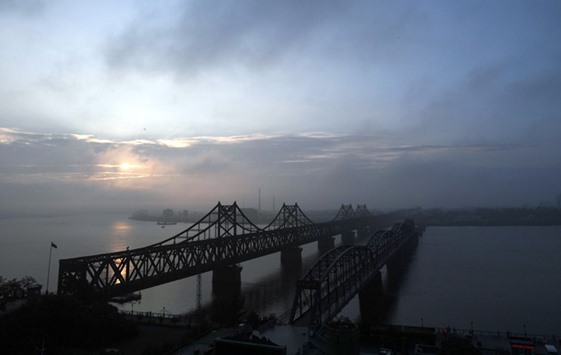South Korea has a plan to annihilate the North Korean capital if it shows any signs of mounting a nuclear attack, according to reports from Seoul.
A military source told the Yonhap news agency every part of Pyongyang “will be completely destroyed by ballistic missiles and high-explosives shells”.
Yonhap has close ties to South Korea’s government and is publicly funded.
On Friday, North Korea carried out what it said was its fifth, and largest, nuclear test.
The international community is considering its response.
The US says it is considering its own sanctions, in addition to any imposed by the UN Security Council, Japan and South Korea.
The South Korean military official told Yonhap that Pyongyang districts thought to be hiding the North’s leadership would be particularly targeted in any attack. The city, the source said, “will be reduced to ashes and removed from the map”.
The BBC’s Korea correspondent Steve Evans says the South is using the same bloodcurdling rhetoric that the North frequently uses about the South Korean government in Seoul.
He says there has been rising criticism within South Korea of the government as its attempts to isolate the North have failed to deter leader Kim Jong-un’s nuclear ambitions.
News of South Korea’s attack plan for the North is believed to have been revealed to parliament following Friday’s nuclear test.
South Korea’s military said the test appeared to be the North’s biggest yet.
Meanwhile, the US’s special envoy for North Korea says Washington is considering taking unilateral action against Pyongyang.
“North Korea continues to present a growing threat to the region, to our allies, to ourselves, and we will do everything possible to defend against that growing threat,” Sung Kim said.
“In addition to sanctions in the Security Council, both the US and Japan, together with [South Korea], will be looking at any unilateral measures as well as bilateral measures as well as possible trilateral co-operation.”
North Korea is banned by the UN from any tests of nuclear or missile technology and has been hit by five sets of UN sanctions since its first test in 2006.
The North said Friday’s test had been of a “nuclear warhead that has been standardised to be able to be mounted on strategic ballistic rockets”.
Estimates of the explosive yield of the latest blast have varied. South Korea’s military said it was about 10 kilo tonnes, enough to make it the North’s “strongest nuclear test ever”. Other experts say initial indications suggest 20 kilo tonnes or more.
North Korea said yesterday a push for further sanctions following its fifth and biggest nuclear test was “laughable”, and vowed to continue to strengthen its nuclear power.
A US special envoy met with Japanese officials yesterday and said later the United States may launch unilateral sanctions against North Korea, echoing comments by US President Barack Obama on Friday in the wake of the test.
“The group of Obama’s running around and talking about meaningless sanctions until today is highly laughable, when their ‘strategic patience’ policy is completely worn out and they are close to packing up to move out,” state-run KCNA news agency cited a North Korean foreign ministry spokesman as saying in a statement later on Sunday.
“As we’ve made clear, measures to strengthen the national nuclear power in quality and quantity will continue to protect our dignity and right to live from augmented threats of nuclear war from the United States,” KCNA added.
The North has yet to demonstrate that it had deployed nuclear-capable missiles, despite claims to have mastered the technology to miniaturise a nuclear warhead to mount it on ballistic missiles.
The UN security council denounced North Korea’s decision to carry out the test and said it would begin work immediately on a resolution.
The United States, Britain and France pushed for the 15-member body to impose new sanctions.
Obama said after speaking by telephone with South Korean president Park Geun-hye and with Japanese Prime Minister Shinzo Abe on Friday that they had agreed to work with the security council and other powers to vigorously enforce existing measures and to take “additional significant steps, including new sanctions”.
“We will be working very closely in the Security Council and beyond to come up with the strongest possible measure against North Korea’s latest actions,” said US envoy Sung Kim yesterday.
“In addition to action in the security council, both the US and Japan, together with the Republic of Korea, will be looking at unilateral measures, as well as bilateral measures, as well as possible trilateral co-operation,” he said, referring to South Korea by its official name.
South Korea’s top nuclear envoy also spoke to his Chinese counterpart late on Saturday by telephone and emphasised the need for fresh countermeasures including a new UN security council resolution during their call, the South Korean foreign ministry said in a statement.
South Korea said on Saturday that the latest test showed North Korea’s nuclear capability was expanding fast and that North Korean leader Kim Jong Un was unwilling to alter course.
Another KCNA report yesterday said North Koreans were “delighted” by the nuclear test.
“The enemies can no longer deny the strategic position of our country as a nuclear weapons state,” Jong Won Sop, a teacher at the University of National Economy, was quoted as saying.

The sun rises over the China-North Korea Friendship Bridge.
